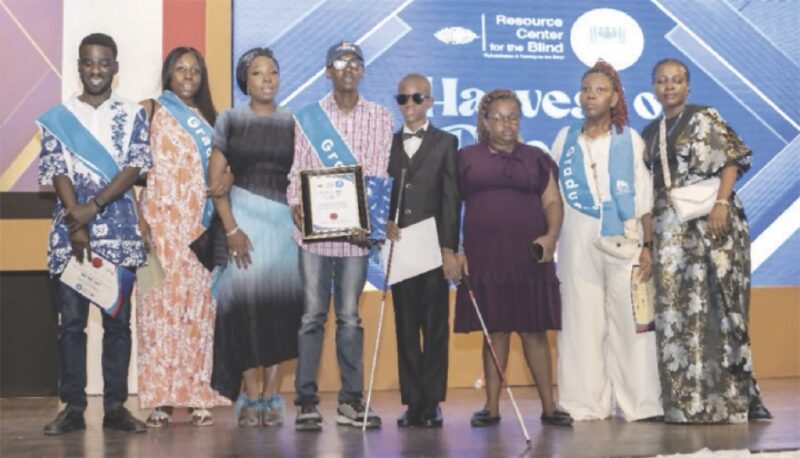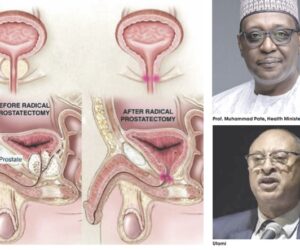By Simeon Mpamugoh
Imagine waking up in the morning and discovering that you are blind. You can no longer see familiar faces, those in your neighborhood, friends, colleagues and relations. It can really benumb any victim of such circumstance.
This is the lot of over 1.1 million people who are blind in Nigeria, with more in different stages of visual impairments. But with no history of blindness in the family other than the concern for people living with disability, Vice Admiral Olukolade Ayinla (rtd) founded a comprehensive rehabilitation and training center for the blind christened: Resource Center for the Blind (RCB) to enable them live independently, and maximize their full potential through empowerment, life skills training and advocacy.
The center is a project of Jubrila Ayinla Foundation. It hosted its third graduation ceremony, donor’s award and fundraising dinner with partners at the MUSON Center, Lagos to celebrate the remarkable achievements of the graduands and to also honour compassion, vision, and generosity that make the moments possible. In attendance were monarchs, government officials, and diplomats, among others.
The executive director, RCB, Mrs Temitayo Ayinla, disclosed that the center was established to take care of persons living with visual impairment, (PLWD). She said: “We noticed that those who are older and have disability don’t come out. They lose hope and feel their lives are shattered by staying at home, and feeling nothing can become of them. So we are opened to give them hope, and help them become productive members of the society through vocational training and rehabilitation so that they can read, become independent and contribute their quota for the benefit of the society.”
Mrs Ayinla recalled that her mum used to take the family to Kano Street in Ebute-Metta, Lagos where beggars used to ask for alms, adding that every time she saw a blind person it was very intriguing because she could see that some of them were independent and able to move about on their own. “When we wanted to start a charitable institution, we realized that persons with visual impairment are left behind in the radder. People focus more on orphans, vulnerable children, and the elderly but this target group is often neglected,” she added.
She noted that the center offered an integrated system for everybody, pointing to a 75-year-old retiree, who suddenly went blind after going through four surgeries. “He felt he was going to be dependent on family. And when he knew about us, he came in and was able to receive training to be independent.
“He almost committed suicide but for RCB intervention, he can now make his bed, cook and use his phone to perform some financial transaction by himself. He no longer depends on family and caregivers because he has received hope and Independence, and today a joyful grandfather enjoying his life.
“We have more than 500 visually impaired individuals, who have received screenings and eyewear, medication and mobility canes. More than 800 individuals reached through training, therapy and support services, and more than 120 students equipped with Braille tools and inclusive resources. Fifteen schools have been supported, including visually impaired learners, and another 30 facilitated over affordable eye surgeries.”
Delivering the keynote address, a multi award winning blind broadcaster with the Lagos Traffic Radio 96.1 FM, Mr Victor Oteri, who spoke on the theme: “Harvest of Dreams: Possibilities Beyond Boundaries,” discribed the event as a harvested dreams and gratitude for growth. He praised the organizers, adding that it provided a deep sense of connection not because of its achievements but its journey, struggles, victories and hope.
The broadcaster revealed that he had worked through life with the reality that society often labeled as limitation, visual impairment, noting that being blind has never meant being visionless.
He commended Lagos State Government for being magnanimous by providing a level playing field to Persons Living With Disability (PLWD), adding that challenges were not roadblocks, rather opportunities to invent new ways of moving forward.
Oteri, who lost his sight at seven to missiles in Ondo State, thanked those who recommended him to Pachelli School for the Blind, Lagos, where he was rehabilitated and introduced to the use of Braille to read. “I went to the school for my primary, Iganmode Grammar School, Ogun State for my secondary, amid several challenges. The story will be told another day.”
He defined the theme of the event as a process of gathering crops or produce when they are riped and ready for consumption or use, adding that “Harvest of Dreams…”is the season or time when crops are gathered or yield itself. It also involves collecting crops such as grains, fruits, vegetables and other farm product from field, orchard, or garden and comes after the toil, patience and faith. It reminds us that the long night, doubts, and unforeseen struggles, eventually would blossom into beautiful, and nourishing season.”
The governor of Lagos State, Mr Babajide Sanwo-Olu, who was represented by his Special Adviser on Islamic Religious Affairs, Dr. Ahmad Abdullahi Jebe, commended the executive director and trustees of the center for their unwavering commitment to the empowerment of the visually impaired individuals. He added that the center has reportedly provided not only knowledge and skills since inception but also dignity and opportunities to countless Lagosians.
In his goodwill message, he said: “Your work is a beacon of hope and a shinning model of inclusion. This event is more than a celebration of academic and vocational milestones, it’s a celebration of courage, resilience, and triumph of human spirit. The graduands had proved that disability doesn’t mean inability, and that one is not defined by limitations, but by strength, vision and achievements.
“Let this recognition inspire them to aim high and to achieve more. I also appreciate the caregivers and staff of the center for their love, patience and unwavering support as well as the quiet steady force that has helped the graduands to reach their potential,” he quipped.
Sanwo-Olu reiterated the state’s total commitment to it policies of inclusion, stressing: “We are dedicated to building a society where no one is left behind. Through the Lagos State Office for Disability Affairs (LASODA) we have been rolling out policies, infrastructure and support systems that ensure equal access and opportunities for individuals with disabilities.
“We have made strides in inclusive education across our public schools, introduced accessible infrastructure in our roads and public buildings, provided vocational trainings and job opportunities and also reinforced legislation to safeguard the rights of people living with disability. Our social protection programmes is intentionally designed to be inclusive, making sure everyone has a space at the development. Our inclusivity is not out of charity, they are fundamental rights and every citizen regardless of his/her logistical abilities deserves the chance to contribute without limit.
“This event should remind us that government, private sector, civil society organization, and individual alike must continue to invest in accessible education, technology, and enabling environment. We must commit ourselves to building a Lagos where ability is recognized, opportunity is shared, and inclusion is the norm.”
For Osun State monarch, Oba (Dr.) Olubayo Adesola Windapo, the event was rather emotional because seeing people who the society had considered to have lost hope, regaining it and becoming useful elements in the society, was marvelous. In his words: “It’s marvelous to see blind broadcaster, teacher, computer analyst and blind students using telephone, and showing proficiency in it.”
The Alara of Ara appealed to the general public to see a lot of hope in people with disability (PWD), calling on NGOs to collaborate with RCB to give hope to the hopeless. He advised members of the public with blind wards to bring them to this kind of forum to see that there is hope. “When they see and hear from those who had been in such situations giving hope to others, they will be better encouraged. Because anyone told that a blind person can operate a computer may not believe it. They live like any sighted person. With their stick, they can go anywhere like a normal sighted person,” he noted.
Chairman/CEO, Nigerians In Diaspora Commission (NIDCOM) Hon. Abike Dabiri Erewa represented by the Head of Lagos Office, Dipo Odebowale, praised the organization for the initiative. She discribed the center as a place where a renewed hope was given to those who were underprivileged in the society. She said: “It’s good and remarkable initiative, which many people never knew it existed in Lagos State. And seeing the kind of enthusiasm and hope been rekindled amongst the graduands, makes me believe that it’s one project that should be supported by well meaning Nigerians. “I call on public spirited individuals to support the initiative so that they can take more people and get their hope renewed and their future assured,” she said.
The Group Managing Director, Sahara Group Foundation
Dr Kola Adesina disclosed that his group “brings energy to life in ensuring that we are equal employers, no matter the limitations. Whether one is living with disability or not, we do not place any limitations in the way we work with individuals and empower talents in Nigeria and beyond.”
Represented by Chidilim Menakaya,. Adesina noted that the event was amazing, pointing to the stories of the graduands and their strides. He said: “Their stories were one of hopelessness but the fact that the resource center had empowered them is actually extraordinary. We believe in the power of potential, impact and light on extraordinary individuals. This is a testament to resilience.”
The Assistant Director and Head of legal services, Lagos State Office for Disability Affairs (LASODA) Babatunde Safiu shared his challenges as a blind person. He explained: “I lost my sight when I was five years old. I went to Pacelli School for the Blind, Lagos for my primary education, Federal Government College, Lagos for my secondary, and University of Jos for my tertiary education.
“The major challenge I had as a blind person was particularly in the university. When it was time to write exams, it was either one used the typewriter or computer which was in vogue then. After the exams and script collected, one is faced with scripts missing because the visually impaired scripts were kept separately. And majority of materials used were not Braille formatted, which posed challenges for the visually impaired. Every blind undergraduate had to find a way of getting his/her Braille books or convert it into soft copy, while our sighted counterparts just bought their books and start reading.. These were coupled with the equipment used by the blind, which were very expensive, he added.
Leading the graduands was 28-years-old Faruq Raji-kolade, who won the best graduating student prize for 2025 set. He is currently pursuing Mathematics Education at the Lagos State University.


